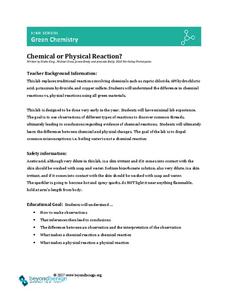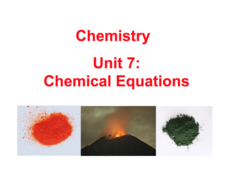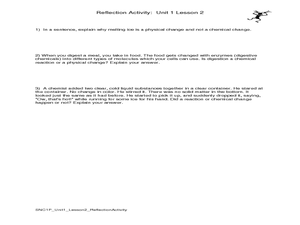Curated OER
Changing Matter
Fifth graders conduct an experiment. In this changing matter lesson plan, 5th graders receive a cup of crystals, record their observations, add water to the crystals and record new observations. Students then discuss the differences...
Curated OER
Chemical Changes
Eighth graders observe two types of interactions in a sealed plastic bag. One bag contains baking soda and water, and the other baking soda and vinegar. They determine what evidence indicates that a chemical change is occurring.
Curated OER
Physical and Chemical Changes
Eighth graders view a PowerPoint presentation that assist them in distinguishing between physical and chemical changes. They compare their observations of demonstrations to a list of clues recognizing types of changes.
Curated OER
Investigating Chemical and Physical Changes
Young scholars explore physical and chemical changes by looking at how different powders react to a variety of substances. They observe and identify the difference between physical and chemical change using a mystery powder.
Curated OER
Chemquest: Physical Changes or Chemical Reactions
Students explore physical and chemical changes. For this chemistry lesson plan, students will go outside to observe changes seen in nature. Students will then work in the lab to identify changes at different stations prior to doing a...
American Chemical Society
Powder Particulars
By both demonstration and hands-on investigation, physical science fanatics come to know that some materials react when they come together. Adding vinegar to both baking soda and to baking powder, the difference between the two is clear....
Curated OER
Activity #13 Changing The Look of Sugar
Students observe what happens when sugar is dissolved in water and when it is heated. They weigh the products after each of the two experiments on a balance scale. Pupils distinguish between physical and chemical changes. Students are...
Curated OER
Heat Loss and Gain in Physical Changes and Chemical Reactions
Students measure the heat of physical and chemical changes in reactions. In this chemistry lesson students determine at what extent changes emit or absorb heat.
Curated OER
Changes in Nature
Fifth graders explore changes in nature. They identify chemical and physical changes in the water cycle, carbon cycle, and weathering. Students explore a chemical or physical change based on a chemical formula. They examine the effects...
Curated OER
Changes in Matter
Eighth graders, in groups, explain the difference between physical and chemical changes.
Curated OER
Physical and Chemical Properties of Matter
Students identify the physical and chemical properties of matter. They review the types of matter. Students list the four states of matter (Solid, Liquid, Gas and Plasma). They recognize and describe the different types of matter.
Beyond Benign
Chemical or Physical Reaction?
Ready to take your chemistry class on its first big lab adventure? Dive in to differentiation between chemical and physical changes with a thoughtfully designed set of experiments! Partners conduct a series of reactions, describe their...
Curated OER
The Chemistry of Refining Crude Oil
Consider our energy sources: wood, coal, oil, uranium. Learners compare the pollution to energy produced for each. They practice fractional distillation of an alcohol/water mixture to simulate the process of refining crude oil....
Utah Education Network (UEN)
Utah Open Textbook: 5th Grade Science
How do Earth's changes affect humans? Pupils learn about physical and chemical changes on Earth and how they lead to erosion, earthquakes, and volcanoes. Using the text, they also explore the concepts of electricity and magnetism by...
Normal Community High School
Chemical Equations
Viewers learn how to identify the substances in a chemical reaction, how to balance it, and the different types of chemical reactions by watching a presentation that also includes a review of monomers and polymers. The presentation ends...
Children's Theatre of Cincinnati
A Charlie Brown Christmas Study Guide
Bring A Charlie Brown Christmas to social studies, language arts, math, science, and art class! Learners ponder the meaning of Christmas trees, write about Christmas during the original release of the television special, research holiday...
Virginia Department of Education
Properties of Compounds and Chemical Formulas
Young chemists have unknown compounds they need to sort. Performing three different tests on each, the chemical behaviors they observe become the basis for data analysis.
Curated OER
Physical and Chemical Changes
In this changes in matter worksheet, students draw a picture that shows physical and chemical changes. This worksheet has 7 fill in the blank questions.
Curated OER
Physical and Chemical Changes
Students differentiate physical and chemical changes. In this chemistry lesson, students identify five indicators that a chemical change took place. They complete a reflection journal at the end of the activity.
Curated OER
Physical and Chemical Changes
Eighth graders distinguish between physical and chemical change. For this chemistry lesson, 8th graders observe a series of demonstrations showing physical and chemical changes. They identify the signs that a chemical reaction took place.
Curated OER
Physical Changes & Chemical Reactions
Fifth graders explore physical and chemical changes. They prepare a demonstration in which they perform an example of either a physical change or a chemical reaction.
Curated OER
Chemical Reactions
In this chemical reaction worksheet, students investigate the results of mixing calcium chloride with sodium bicarbonate. They observe the chemical and physical changes that occur, identify the properties of the chemical before and after...
Curated OER
What is a Chemical Reaction?-Evidence of Change
In this chemical reactions learning exercise, students experiment with hydrochloric acid and copper (I) chloride to identify the types of reactions they undergo with various other substances. They also observe the law of conservation of...
American Chemical Society
Curious Crystals
Crystals are more than meets the eye! Can learners tell them apart simply by observation? As they examine five samples with a magnifier, they find that appearance alone is not enough. This serves as an introduction to a mini unit on...

























